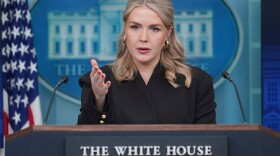For the second time in two months, the Trump administration has sided with the for-profit college industry over a key constituency: veterans. In May, the president vetoed a bipartisan bill promoting debt forgiveness for veterans who were defrauded by for-profit schools. Now, the Department of Veterans Affairs is allowing two repeat-offending schools access to GI Bill money.
Last year, the Federal Trade Commission laid enormous penalties on several colleges for deceptive advertising. One of the schools had been caught pretending to be affiliated with the Army in one of its online recruiting sites. Another, the University of Phoenix, agreed to pay $191 million for misleading students about job placements.
Reporting of deceptive practices triggered the VA to block the University of Phoenix, Perdoceo Education Corp. — in addition to Bellevue University and Temple University — from enrolling GI Bill students.
"The law says the secretary shall not approve GI bill money for schools that use deceptive recruiting," says Carrie Wofford with Veterans Education Success, an advocacy group.
That'd be a huge blow to the for-profit schools, which need GI Bill funding to take advantage of a legal loophole in what's called the 90-10 rule. The rule requires schools to get a minimum of 10% of their funds from sources other than government aid. The loophole says GI Bill funds don't count toward that 90% maximum quota of federal aid. University of Phoenix is the largest recipient of GI Bill funds in the 80-year history of the program.
After the FTC settlement, the VA announced in March that it would block the offending schools from enrolling GI bill students. But Wofford says intense lobbying by the for-profit school industry ensued, and on the eve of the July Fourth holiday, the VA lifted the ban.
"University of Phoenix, Perdoceo Education Corporation, Bellevue University and Temple University have taken adequate corrective measures," VA spokeswoman Christina Noel said in an email to NPR. She said that included restitution to some students, changes in leadership at the schools and cooperation with VA reviews.
"VA will continue to act in the best interest of our nation's servicemembers, veterans and taxpayers, and we look forward to working with these schools to ensure they fulfill the requirements for GI Bill enrollments," Noel said.
University of Phoenix put out a statement praising the Trump administration's decision.
"The University has always respected that student veterans have earned the right to choose the institutions that best fit their needs, and this news vindicates that principle," the statement read.
Wofford says she's disappointed but not surprised.
"It feels like yet another blow to veterans and students in order to help predatory for-profit colleges that keep getting caught by federal and state law enforcement for breaking the law," Wofford said.
Tasha Berkhalter lost all her GI Bill money, and went in to debt, at ITT Tech in Indiana. Berkhalter says not enough has been done to help veterans like her.
"We always say in the military that you leave no soldier behind and I definitely feel left behind, by my president, by my government," Berkhalter said.
When Berkhalter graduated, she discovered that her four-year degree in criminal justice was worthless — not recognized by employers or other schools.
A bipartisan bill would have provided debt forgiveness to veterans defrauded by schools like ITT, but President Trump vetoed it in May. Now Berkhalter says she's struggling to feed her family.
"It is an elephant on your back," she said. "I don't have $100,000 to just go pay it off and be done with it. We have four kids. Our faith keeps us, we believe in God and that's kind of what's keeping us afloat."
There is another bipartisan bill in Congress that would change the law and limit access by for-profit colleges to GI Bill dollars. It's unlikely to be signed this year.
Copyright 2020 NPR. To see more, visit https://www.npr.org. 9(MDAyMTYyMTU5MDEyOTc4NzE4ODNmYWEwYQ004))









